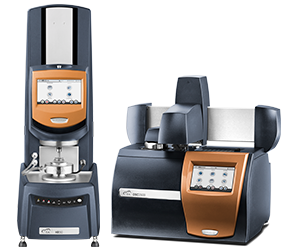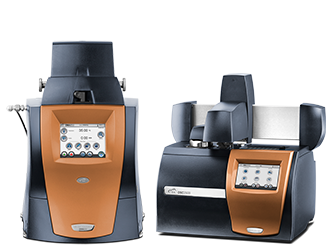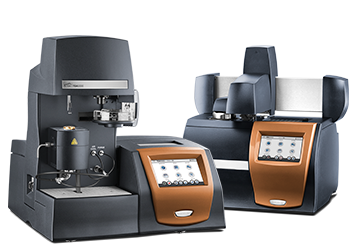Enhance Your Materials From Precure to Final Cured Composite
TA Instruments | Waters have put together three lab packages designed specifically for your composite materials lab. Whether you are testing your composites formulation or your products final performance these instrument packages will complete your lab.
COMPOSITE FORMULATION PACKAGE
Optimize formulations for efficient production and enhanced performance
Easily quantify the effects of formulation changes on cure reaction kinetics and working time
Tracking the cure reaction in real-time allows you to clearly pinpoint the minimum viscosity and gel point with confidence. The Discovery Hybrid Rheometer’s low torque performance delivers accurate data from beginning to end of your cure experiment. Complement your rheology measurements with cure reaction kinetics from the best performing DSC for complete resin characterization.
Combine the DSC and HR 30 to:
- Characterize resins
- Quantify cure strength
- Measure residual cure
- Optimize molding conditions and cycle times
- Test solids with the HR 30’s fully integrated DMA capabilities
- Identify adequate end use temperature ranges
The DHR offers the widest range of composites capabilities and accessories. You can go from monitoring the cure reaction to testing completed solids with a simple geometry swap and minimal training. And with the DSC, your lab will optimize every step of production to save time and money.

RESIN FORMULATION PACKAGE
Design production conditions to maximize product performance
How the DSC 250 Auto and DMA 850 together will benefit your lab:
Easily study the effects of formulation changes on cure reaction kinetics, working time, and product performance.
Changes to resin formulation through concentration changes and ingredient swapping have a direct impact on the curing kinetics, working time, and performance of the cured composite. Quantifying the impact of the changes is easily accomplished with measurements on the DSC 250. Save time and money by utilizing this information to tailor the reaction kinetics and predict product performance, thereby streamlining product development.
Experience complete characterization across all stages – precure, through the cure, and final cured composite.
Combine the DSC 250 and DMA 850 to:
- Bridge the gap between formulation changes and their impact on final composite product performance
- Quantify formulation impacts on the cured composite’s
- Cure Strength
- Flexibility
- Adequate end use temperature ranges
The DSC 250 and DMA 850 work together to bridge the gap between formulation changes and their impact on final composite product performance. The flat baseline of the DSC 250 and rugged DMA 850 frame deliver clear and accurate measurements allowing you to quantify formulation impacts on the cured composite’s cure strength, flexibility, adequate end use temperature ranges, and more.

PRODUCT PERFORMANCE PACKAGE
Optimize resin to filler ratios to maximize product performance
Quantify the effects of formulation changes on cure reaction kinetics or curing temperature
Capture cure temperature reaction kinetics from the DSC to tailor cure conditions and formulation during R&D. Optimize processing, including oven temperature, molding times, and more. DSC can also be used to determine residual cure, an important step in QA/QC for preventing product failure.
Accurately measure composite composition and predict performance
Fillers impact a resin’s ability to cure and influence the final product’s strength, hardness, and flexibility, as well as the electric and dielectric properties of the composite. Determining filler content and concentration during formulation with TGA is crucial for predicting product performance. TGA can also help users verify that the resin and filler work together to form effective products.
Finished products can also be evaluated with TGA to determine degradation temperature, especially for applications that require elevated temperatures. When combined with EGA, TGA can measure off-gas components to prevent hazardous health concerns upon decomposition.
The DSC maximizes product performance
- Quantify the effects of formulation changes on cure reaction kinetics or curing temperature
- Capture cure temperature reaction kinetics to tailor cure conditions and formulation during R&D
- Determine residual cure during QA/QC to prevent product failure
Utilize the TGA to accurately measure composite composition
- Determine filler content and concentration during formulation to predict product performance
- Verify that the resin and filler work together to form effective products
- Determine degradation temperature in final products especially for applications requiring elevated temperatures
- When combined with EGA, TGA can measure off-gas components to prevent hazardous health concerns upon decomposition


